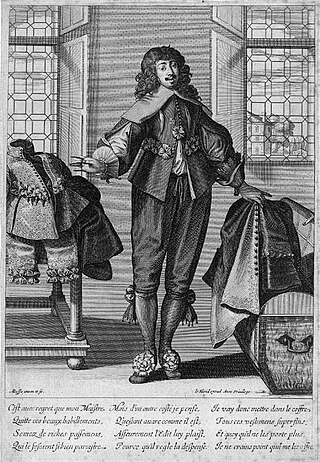
The belfry is a structure enclosing bells for ringing as part of a building, usually as part of a bell tower or steeple. It can also refer to the entire tower or building, particularly in continental Europe for such a tower attached to a city hall or other civic building.

A seraglio, serail, seray or saray is a castle, palace or government building which was considered to have particular administrative importance in various parts of the former Ottoman Empire.

A livery is an identifying design, such as a uniform, ornament, symbol or insignia that designates ownership or affiliation, often found on an individual or vehicle. Livery often includes elements of the heraldry relating to the individual or corporate body feature in the livery. Alternatively, some kind of a personal emblem or badge, or a distinctive colour, is featured.

A valet or varlet is a male servant who serves as personal attendant to his employer. In the Middle Ages and Ancien Régime, valet de chambre was a role for junior courtiers and specialists such as artists in a royal court, but the term "valet" by itself most often refers to a normal servant responsible for the clothes and personal belongings of an employer, and making minor arrangements. In the United States, the term most often refers to a parking valet, and the role is often confused with a butler.

An official is someone who holds an office in an organization or government and participates in the exercise of authority. An elected official is a person who is an official by virtue of an election. Officials may also be appointed ex officio. Some official positions may be inherited. A person who currently holds an office is referred to as an incumbent. Something "official" refers to something endowed with governmental or other authoritative recognition or mandate, as in official language, official gazette, or official scorer.

A henchman is a loyal employee, supporter, or aide to some powerful figure engaged in nefarious or criminal enterprises. Henchmen are typically relatively unimportant in the organization: minions whose value lies primarily in their unquestioning loyalty to their leader. The term henchman is often used derisively, or even comically, to refer to individuals of low status who lack any moral compass of their own.

A coachman is an employee who drives a coach or carriage, a horse-drawn vehicle designed for the conveyance of passengers. A coachman has also been called a coachee, coachy,whip, or hackman.
Folk etymology is a change in a word or phrase resulting from the replacement of an unfamiliar form by a more familiar one through popular usage. The form or the meaning of an archaic, foreign, or otherwise unfamiliar word is reinterpreted as resembling more familiar words or morphemes.
A stable master or head groom is the manager in charge of a stable.

A company, abbreviated as co., is a legal entity representing an association of people, whether natural, legal or a mixture of both, with a specific objective. Company members share a common purpose and unite to achieve specific, declared goals. Companies take various forms, such as:

A livery yard, livery stable or boarding stable, is a stable where horse owners pay a weekly or monthly fee to keep their horses. A livery or boarding yard is not usually a riding school and the horses are not normally for hire. Facilities at a livery yard normally include a loose box or stable and access for the horse to graze on grass.
Vetting is the process of performing a background check on someone before offering them employment, conferring an award, or doing fact-checking prior to making any decision. In addition, in intelligence gathering, assets are vetted to determine their usefulness.













